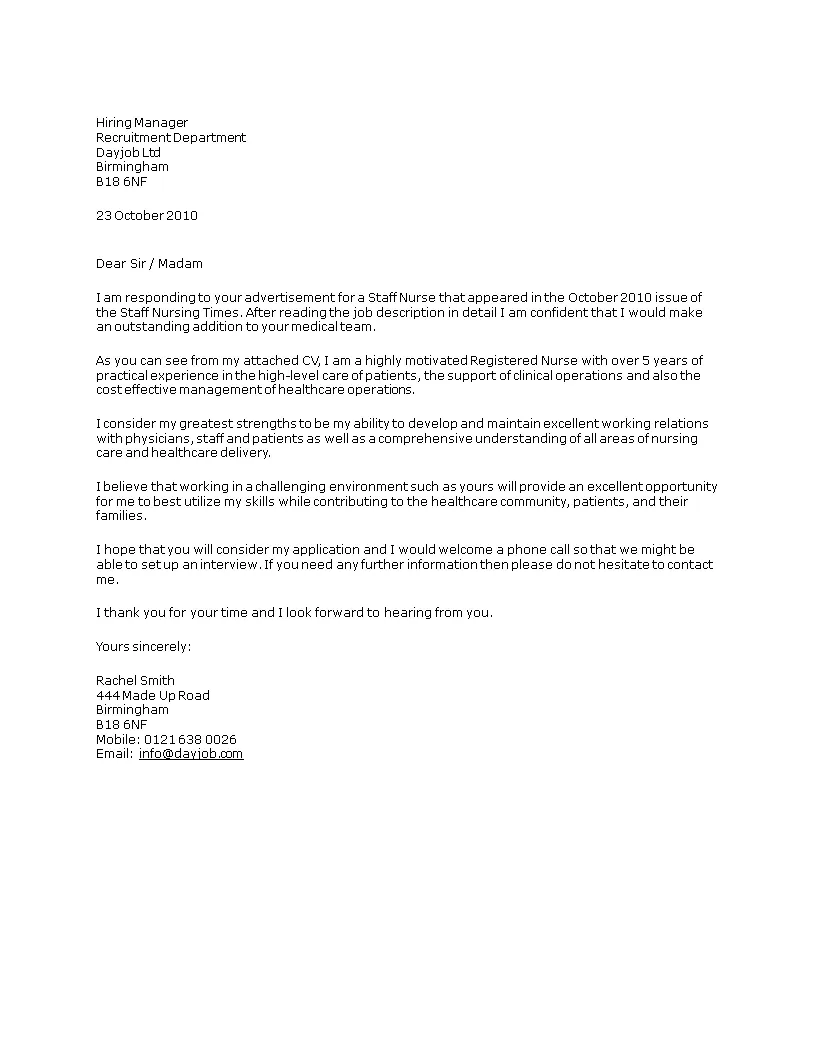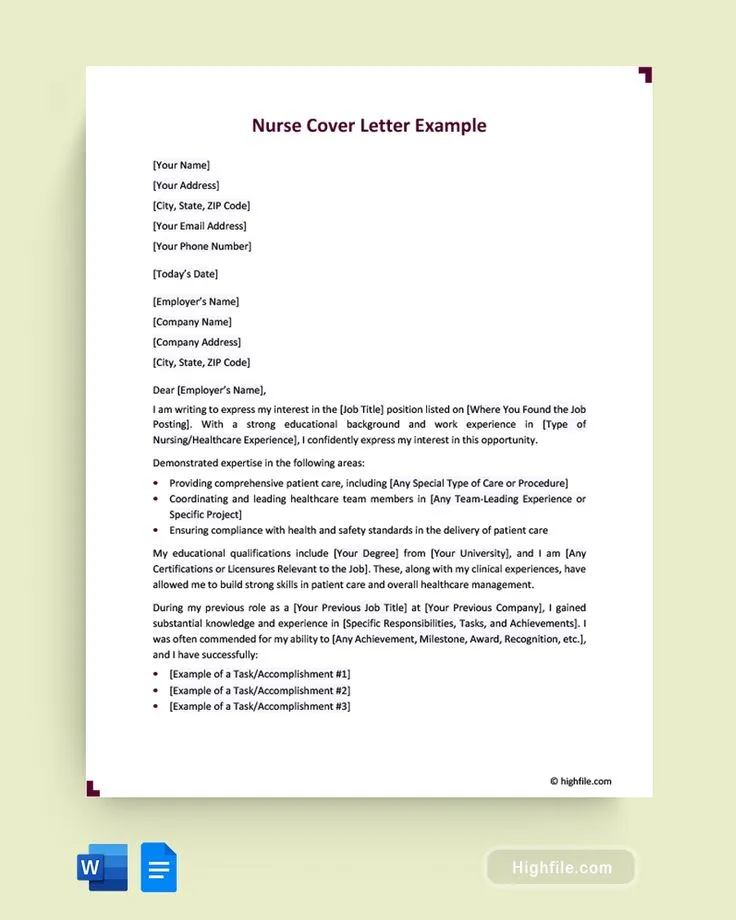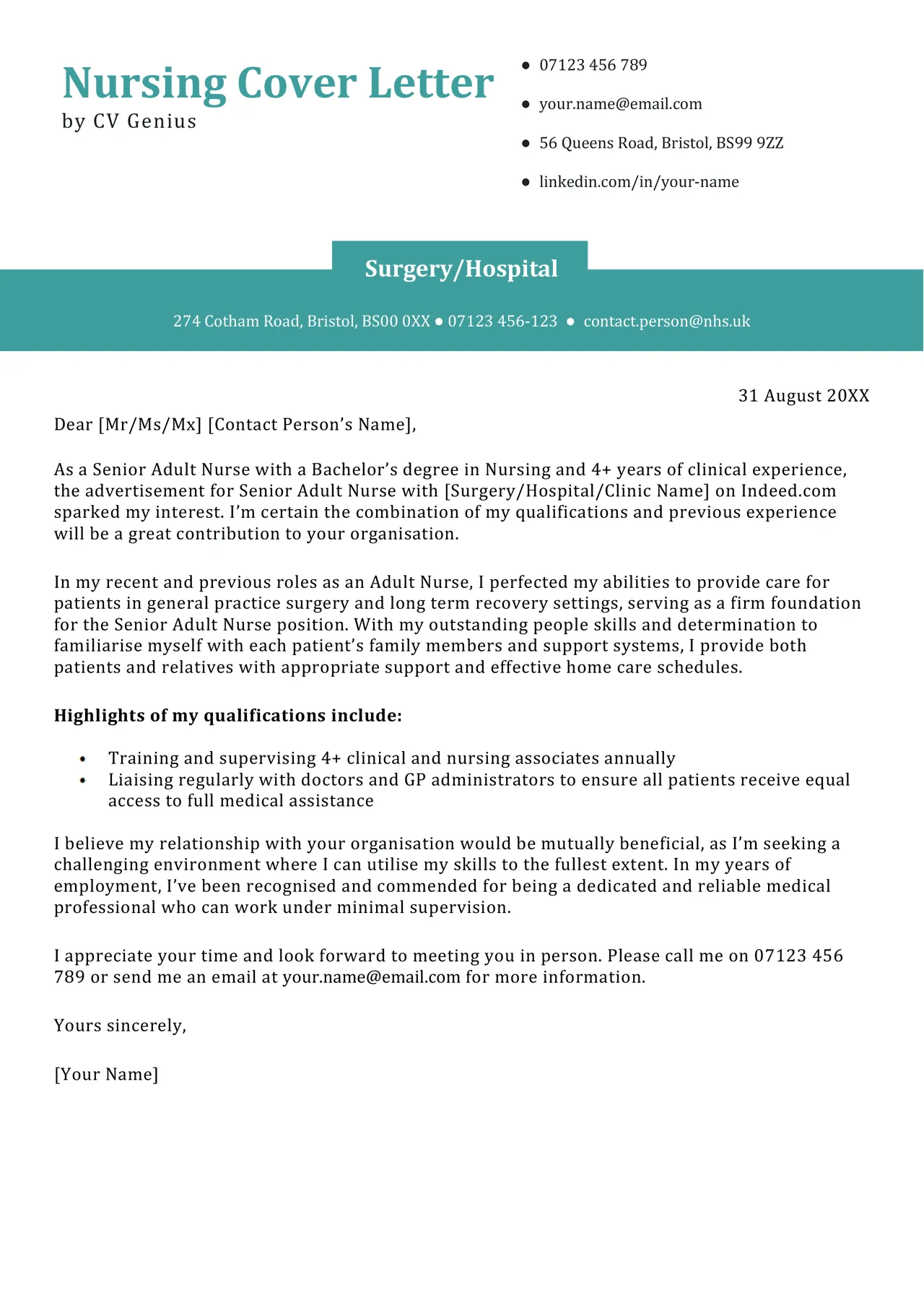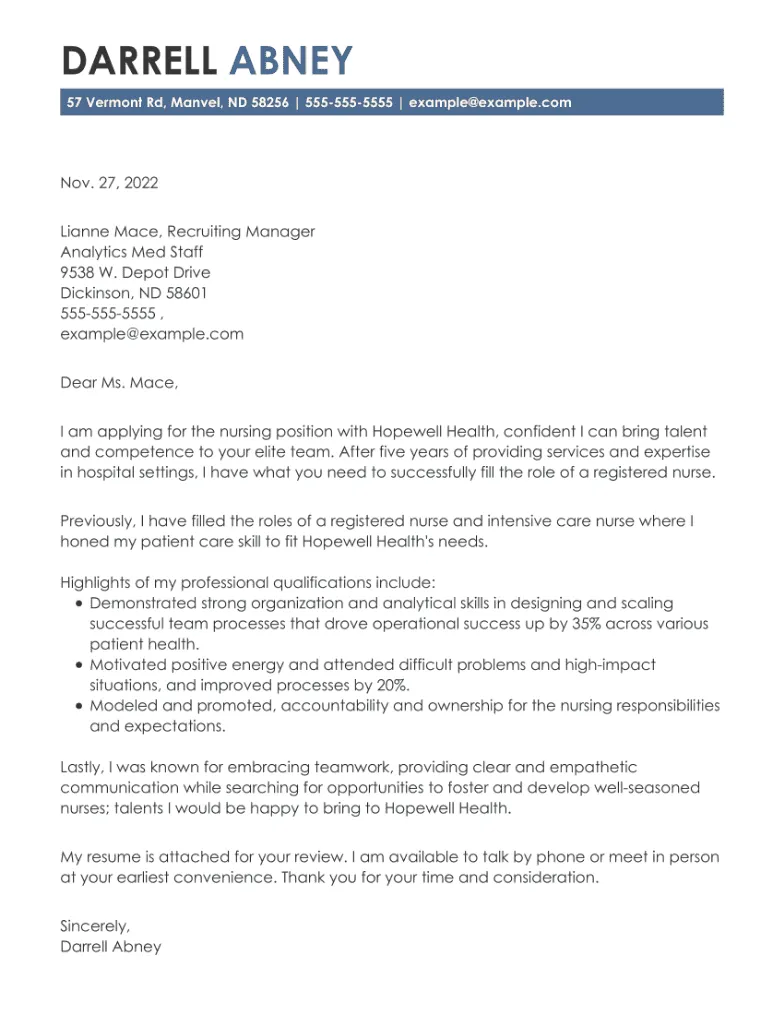Crafting a Nurse Cover Letter That Stands Out
A compelling cover letter is your first opportunity to make a strong impression on a potential employer. In the competitive field of nursing, a well-crafted cover letter can be the key to securing an interview and ultimately, your dream job. This guide provides comprehensive strategies and tips to help you create a standout cover letter that highlights your skills, experience, and passion for nursing. By following these guidelines, you can significantly increase your chances of landing your ideal nursing position and embarking on a fulfilling career in healthcare. The goal is not just to submit a letter, but to strategically present yourself as the best candidate for the job.
Understanding the Importance of a Nurse Cover Letter
Your nurse cover letter serves as a crucial introduction, setting the tone for your application. It’s not merely a formality; it’s a chance to showcase your unique qualities and connect with the hiring manager on a personal level. Unlike a resume, which presents a factual overview of your experience, the cover letter allows you to demonstrate your personality, articulate your career goals, and explain why you’re the perfect fit for the role and the healthcare facility. A well-written cover letter can differentiate you from other applicants and make a lasting positive impression, leading to a call for an interview.
Highlighting Your Nursing Skills and Experience

When highlighting your nursing skills and experience, be specific and provide concrete examples. Instead of simply stating that you are proficient in patient care, describe specific situations where you successfully managed patient needs. Quantify your achievements whenever possible. For example, instead of saying you improved patient satisfaction, mention you increased satisfaction scores by a certain percentage. Use action verbs and focus on your accomplishments. For example, ‘Administered medications to over 50 patients daily with 100% accuracy’ or ‘Successfully managed a team of nurses, resulting in improved workflow efficiency’. Showcase your technical skills like IV insertion, wound care, and electronic health record proficiency, and also emphasize your soft skills like communication, empathy, and critical thinking. Remember to tailor your skills to match the job description.
Tailoring Your Cover Letter to the Specific Job
Generic cover letters are easily spotted and often discarded. Customize your cover letter for each job application. Carefully review the job description and identify the key skills, experience, and qualifications the employer is seeking. Use this information to tailor your letter to highlight the relevant aspects of your background. Address the specific needs of the position and explain how your skills align with the job requirements. If the job emphasizes a certain skill like critical care or pediatric experience, make sure to emphasize that in your cover letter. By demonstrating that you’ve taken the time to understand the role and the employer’s needs, you significantly increase your chances of success.
Researching the Healthcare Facility
Before you start writing, research the healthcare facility. Understand their mission, values, and the type of care they provide. Visit their website, read patient reviews, and explore their social media presence. This research will help you tailor your cover letter to demonstrate your genuine interest in the facility. Highlight any of their programs, initiatives, or values that resonate with you. For example, if the hospital is known for its commitment to patient-centered care, mention your experience and passion for this approach. Showing that you’ve done your homework demonstrates initiative and a genuine interest in the organization, increasing your chances of making a positive impression and getting hired. This will show the hiring manager you’re not just looking for any job but are specifically interested in working at their facility.
Demonstrating Your Passion for Nursing

Your passion for nursing should be palpable throughout your cover letter. Share what motivates you and what you find rewarding about the profession. Discuss experiences that have shaped your commitment to patient care, such as a challenging case you successfully managed or a moment when you made a significant impact on a patient’s life. Explain why you are drawn to nursing and what you hope to achieve in your career. Avoid generic statements; instead, be authentic and let your personality shine through. Consider discussing your specific interests within nursing, such as your passion for critical care, pediatrics, or geriatrics. This helps to showcase your dedication to your chosen field.
Showcasing Your Achievements
Focus on your achievements and quantify your accomplishments whenever possible. Instead of simply stating that you are a competent nurse, provide specific examples of your successes. For instance, mention the positive impact you had on patients’ health outcomes or any improvements in work processes you facilitated. Use the STAR method – Situation, Task, Action, Result – to effectively communicate your achievements. Describe the situation or problem you faced, the task you were assigned, the actions you took, and the positive results you achieved. Highlighting your achievements shows employers what you can bring to their team and how you’ve made a difference in previous roles, which can significantly increase your chances of getting an interview.
Writing a Strong Opening and Closing
The opening paragraph should immediately grab the reader’s attention. Start with a strong statement that highlights your enthusiasm for the position or the organization. State the specific job you’re applying for and how you learned about the opportunity. Briefly mention your key qualifications and how they align with the job requirements. In the closing paragraph, reiterate your interest in the position and thank the reader for their time and consideration. Express your eagerness to discuss your qualifications further in an interview. Provide your contact information and indicate that you are available for an interview at their earliest convenience. A well-crafted opening and closing can significantly increase your chances of making a lasting impression.
Formatting and Proofreading Your Cover Letter

Formatting and proofreading are crucial to presenting a professional image. Use a clean, easy-to-read font like Times New Roman or Arial. Maintain a consistent format throughout the document, including margins, spacing, and paragraph alignment. Keep the letter concise and within one page. Proofread carefully for any grammatical errors, spelling mistakes, or typos. Ask a friend, family member, or career counselor to review your letter before submitting it. Errors can undermine your credibility and make it appear that you lack attention to detail. Ensuring your cover letter is well-formatted and error-free demonstrates professionalism and attention to detail.
Including Relevant Keywords
Optimize your cover letter for applicant tracking systems (ATS) by including relevant keywords from the job description. ATS are used by many employers to scan applications and filter out unqualified candidates. Identify the key skills, qualifications, and experience mentioned in the job posting and incorporate these keywords naturally into your cover letter. Review the job description and list the most important keywords. Integrate these terms throughout your cover letter, including in your skills and experience sections. Use a variety of synonyms and related terms to avoid keyword stuffing and ensure that your letter reads naturally. This strategic use of keywords can significantly improve your chances of passing the initial screening process and getting your application noticed by a human reviewer.
Following Up on Your Application
After submitting your application, follow up with the hiring manager or the contact person mentioned in the job posting. Send a brief email or make a phone call to express your continued interest and reiterate your qualifications. This demonstrates your enthusiasm and initiative. Ask about the status of your application and when you might expect to hear back. However, avoid being overly persistent or contacting the employer multiple times. A follow-up one to two weeks after the application deadline is generally appropriate. This follow-up demonstrates your dedication to the application process and ensures your application remains top-of-mind.
